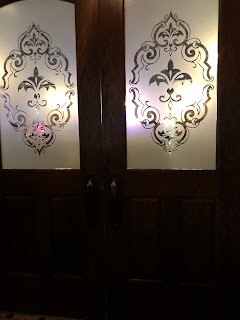When you look up overthinking in the dictionary, that's my picture beside the definition. Bet you didn't know that. I have a kind of love/hate relationship with overthinking. On the one hand, overthinking is the artistic drive to make a piece match a vision. I'll give that some respect. On the other hand, though, it's paralysis and there's a ton of slow going everyplace in between the two poles.
I can't tell anyone how to stop overthinking. It's one of my biggest hurdles. I have amassed a toolbox around it, though, and you're welcome to rummage through for useful tidbits.
1. Binaural beats - 40k in particular which has some bit of science behind showing it helps with focus, attention, and flow. The theory is that varied frequencies going in each ear regulate brainwaves in a particular way and invoke a state of some kind. These require stereo headphones and low volume - just at the edge of awareness. You can find pure pulse tones or you can find the beats integrated into music. Experiment. Your brain may, like mine, find the pure tones too dis-regulating but the musical ones to be just fine.
2. Enforced speed - Twice a month, a group of writers gets together in a writing game. For two hours we run timed writing sprints against monsters. Each monster is worth a specific word count value. Everyone in the group pools their words against the critter. Each session is timed - if time runs out before we hit word count, the monster wins. If we hit word count before the clock runs out, the writers win. This practice is valuable for me because it forces me to just keep going - no don't go back to correct the typo. Leave the sentence fragment alone. Keep going. Keep going. Keep going. I can't say I come away with usable scenes for a book from this exercise but what I do get are snippets of usable stuff. Writing that fast ends up being a lot of stream of consciousness for me. If I can keep my stream of consciousness focused on the story I'm working on, then all of the noodling and overthinking gets channeled out of my head and onto that virtual page. From it, I can glean conversations, conflicts, and opportunities for the actual story. It's a good reminder that it's okay to feel my way through a story and to worry about fixing things later.
3. Default mode - apparently, our brains have a default mode wherein some much needed sorting and rearranging gets done. This happens when we slip into daydreaming or staring off into space. It happens when we engage in repetitive physical tasks like vacuuming a room or sweeping or washing dishes or ironing. It is a brainwave shift, absolutely, but it isn't something we *do*. It's something that happens. Default mode sort of sneaks up on us. In default mode, it's as if someone is in our heads unplugging this bit over here, untangling the cord and then plugging it in over there but with lots and lots of stuff. Kind of a mental defragmentation process. If I'm really up against an overthinking wall, convinced there's only one right way through a story and I haven't found it yet, I'll get up, walk outside and spend 10 to 20 minutes pulling weeds in the garden. Or I'll sweep up cat litter, or do dishes, whatever simple, repetitive physical task that takes very little thought. A walk around the block would serve as well. Just take note that screens / social media are never ever the answer.
4. Get back in the body - overthinking tends to pull the nervous system into a fight, flight, fawn, or freeze state. Maybe overthinking is an evolutionary trait of some kind that helped our ancestors survive because it often feels like not getting a story exactly right is an existential threat. Yoga nidra is useful, in that case, as it's designed to sooth the nervous system out of fight or flight and reset your brain as well.
I hope you find something useful in this set of tools. I'm still a work in progress on the overthinking front. Believe me when I say I'm combing the other posts for more tips, tricks, and tools. What a relief it would be to one day just write a story and not hit that wall that makes me look back and wonder if I did all those words, threads, and characters right. Especially since, for me, that wall is never at The End.











